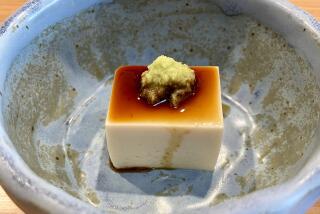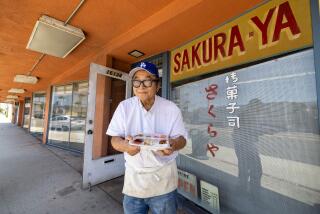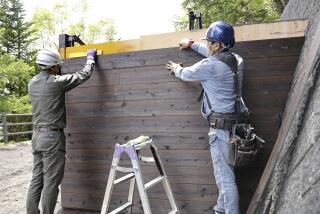Hottest Ticket in Town
- Share via
HAKUBA, Japan — Let it snow, let traffic be slow, let them even postpone Olympic events, Japanese can make merry just as long as the hot springs stay open.
“Never mind the terrible weather, nature has given us hot springs,” declared Iwao Morita, 55, a house painter. He and his friends made the trek to this tiny ski town only to find Sunday’s and Monday’s men’s Alpine skiing events victims of thick, wet snow.
Like almost everyone else snowed in here, they went to the baths instead.
“The purpose of going in a hot springs is, of course, to enjoy the hot water and so on, but also to look at the bodies of the other guys and think, ‘I’ve gotten flabby. I’ve got to work out harder,’ ” said Morita, as he prepared to enter the competitive waters of the Happo’One Onsen, one of 12 natural hot springs in a town with a population of 9,255.
“You just relax into the water and forget about work,” Morita said. “And then you think, ‘That guy has a great body. I’ve got to catch up with him.’ Sometimes when I get out I do push-ups, 20 or 30.”
Japanese have been dipping in hot springs, known here as onsen, since the earliest recorded history. Folklore has it that two Japanese gods of medicine caused hot springs to gush forth all over the country in order to heal the sick. Belief in the medical efficacy of scalding hot mineral waters is no less strong today.
“In an ordinary bath, only the surface of your skin gets warm, but with an onsen, the inside of your body gets warm, and your heart gets warm too. That’s the most important thing,” said Osamu Uchiyama, 30, an engineer volunteering at the Olympics, as he rode a slow bus down the snowy Happo mountain to town, anticipating the pleasures of a night of drinking and steeping himself in a hot bath.
Japan, a unquiet land of volcanoes and earthquakes, has 2,053 natural hot springs, more than any other nation, according to the authoritative Sekai Encyclopedia. (China is in second place with 1,900 and the U.S. ranks third with 1,003.) The total energy released by the hot springs during one year is close to the thermal energy released by a small-scale volcanic eruption.
Onsen appreciation is a fine art here. Discussions of the merits of various hot springs, including temperature, water composition, bath size and quality, accessibility and the beauty of the surrounding scenery, are conducted with the same intensity that Southern Californians display when talking real estate.
“Sweet water is the very best,” said Morita. “If it’s tasty to drink, it’s great for an onsen.”
However, he said, “The very best onsen is the one you take together with good friends.”
Said Maho Oue, 30, a hospital clerk from Hyogo prefecture, “Outdoor baths are the best. They’re cold but you can admire the scenery. It’s so atmospheric. And if it snows, it’s even better.”
Oue took an eight-hour bus ride to see the men’s downhill race Sunday but instead spent the day skiing herself.
“I like to go skiing in places that have onsen,” she said. “If you take one after skiing, your fatigue disappears.”
She favors sulfur-smelling waters, “because you feel like it’s really working. You feel healthier.”
For at least 400 years, ordinary Japanese have saved their money to go on onsen tours, and weekend hot-springs getaway packages remain a staple of Japan’s travel industry.
Enthusiasts like Morita will drive five hours for a good bath. He planned his Olympic itinerary by calculating the proximity of parking lots to hot springs in areas that were also within striking distance of events.
“It has to be close enough so you don’t cool down,” he said.
Japan’s ski resorts are hurting these days, as a long economic slump shows signs of worsening. The Economic Planning Agency has announced that the economy is “stagnating,” a word it has not used since the 1974 “oil shock” sent the Japanese economy into recession. The number of skiers is reportedly down about 10% so far this year, and hotels and inns outside of Nagano are complaining of slow bookings as anxious Japanese consumers cut back on spending.
But business at Happo’One, which is run by a ski-lift company, has increased at least 10% because of an influx of young day trippers who stop in for a quick dip before driving home, said Keizo Kitazawa, who works the onsen counter. The onsen offers cheap pleasure: Admission is about $3.30 for adults, $1.60 for children, and one of Japan’s ubiquitous vending machines dispenses a cold beer for $2.40.
Anxious that foreigners who come to visit for the Olympics might commit the most unthinkable of Japanese etiquette lapses and soap themselves up in the massive tub, the onsen has posted instructions on proper bathing in English, Korean, Chinese and Japanese.
Washing thoroughly is mandatory before entering the tub. The rule is flouted only by the wild monkeys who also like to lounge in outdoor hot springs on cold days.
For everyone else, Uchiyama helpfully explained the rules for Japanese-style bathing.
“One, your towel doesn’t go in the water, it goes on your head,” he said, as his friends giggled and egged him on.
“Two, step into the bath very slowly and say ‘Atsu-tsu-tsu-tsu!’ (Hot-hot-hot-hot). Three, you have to say ‘Aaaaaaah!’ This is the Japanese way.”
More to Read
Sign up for The Wild
We’ll help you find the best places to hike, bike and run, as well as the perfect silent spots for meditation and yoga.
You may occasionally receive promotional content from the Los Angeles Times.






